

Haiti: Where Did The Money Go? Money Reaches Haiti, but Where will it Go? In this photo released by the United Nations, earthquake survivors' tents are seen between buildings in Port au Prince, Haiti, Wednesday, Jan. 13, 2010.
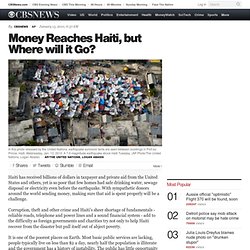
A 7.0-magnitude earthquake struck Haiti Tuesday. (AP Photo/The United Nations, Logan Abassi) AP/The United Nations, Logan Abassi Haiti has received billions of dollars in taxpayer and private aid from the United States and others, yet is so poor that few homes had safe drinking water, sewage disposal or electricity even before the earthquake. With sympathetic donors around the world sending money, making sure that aid is spent properly will be a challenge. Corruption, theft and other crime and Haiti's sheer shortage of fundamentals - reliable roads, telephone and power lines and a sound financial system - add to the difficulty as foreign governments and charities try not only to help Haiti recover from the disaster but pull itself out of abject poverty.
Where Haiti’s money has gone. What happens when you drop billions of dollars onto a country like Haiti?
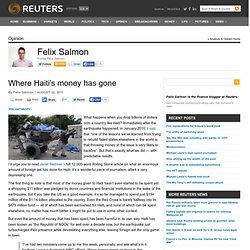
Immediately after the earthquake happened, in January 2010, I said that “one of the lessons we’ve learned from trying to rebuild failed states elsewhere in the world is that throwing money at the issue is very likely to backfire”. But that’s exactly what we did — with predictable results. I’d urge you to read Janet Reitman’s full 12,000-word Rolling Stone article on what an enormous amount of foreign aid has done for Haiti; it’s a wonderful piece of journalism, albeit a very depressing one. Www.haitispecialenvoy.org/download/International_Assistance/2-overall-financing-data.pdf. Www.haitispecialenvoy.org/download/International_Assistance/1-overall-financing-key-facts.pdf.
Haiti, ten months later. Haiti NGO accountability. Where Did All the Haiti Money Go? By Nicole C.
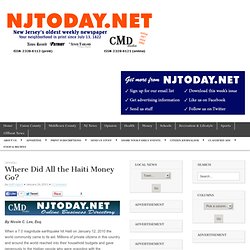
Lee, Esq. When a 7.0 magnitude earthquake hit Haiti on January 12, 2010 the world community came to its aid. Rebuilding Haiti: How Not to Do it. Where did all that Haiti aid money go? PORT-AU-PRINCE, Sunday 9 January 2011 (AFP) - International donors pledged almost 10 billion dollars to reconstruct Haiti.
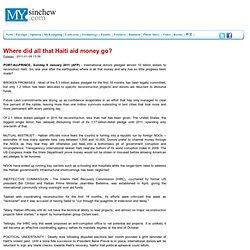
So, one year after the earthquake, where is all that money and why has so little progress been made? BROKEN PROMISES - Most of the 5.3 billion dollars pledged for the first 18 months has been legally committed, but only 1.2 billion has been allocated to specific reconstruction projects and donors are reluctant to disburse funds. Future cash commitments are drying up as confidence evaporates in an effort that has only managed to clear five percent of the rubble, leaving more than one million survivors subsisting in tent cities that look more and more permanent with every passing day.
Where did all that Haiti aid money go?: News24: World: News. Port-au-Prince - International donors pledged almost $10bn to reconstruct Haiti.
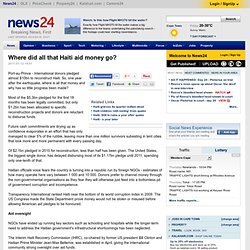
So, one year after the earthquake, where is all that money and why has so little progress been made? Most of the $5.3bn pledged for the first 18 months has been legally committed, but only $1.2bn has been allocated to specific reconstruction projects and donors are reluctant to disburse funds. Future cash commitments are drying up as confidence evaporates in an effort that has only managed to clear 5% of the rubble, leaving more than one million survivors subsisting in tent cities that look more and more permanent with every passing day.
Of $2.1bn pledged in 2010 for reconstruction, less than half has been given. The United States, the biggest single donor, has delayed disbursing most of its $1.17bn pledge until 2011, spending only one-tenth of that. Haitian officials voice fears the country is turning into a republic run by foreign NGOs - estimates of how many operate here vary between 1 000 and 10 000. Where did the money donated to Haiti go? Paul Farmer Examines Haiti 'After The Earthquake' Haiti After The EarthquakeBy Paul FarmerHardcover, 456 pagesPublicAffairsList price: $27.99 The Catastrophe On January 13, the day after an earthquake struck Haiti's capital, I finally got through to Dr.
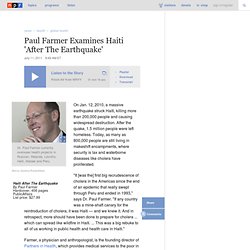
Alix Lassegue, the medical director of Port-au-Prince's largest hospital and a longtime friend. The hospital's real name is l'Hopital de l'Universite d'Etat d'Haïti, but most people call it the General Hospital. I began trying to reach Lassegue a couple of hours after the quake. So now what? "What do you most need?
" Lassegue would hear this question again and again over the next weeks and months, usually with scant practical outcome, but this was early in the game — less than twenty-four hours after the quake. Of course he needed just about everything, including electricity, supplies, salaries, and medications; the hospital had been scrambling for all these even before the quake. Lassegue kept talking. Haiti: Where did all the money go? By Nicole C.

Lee. Haiti Relief: Where Did the Money Go? “Haiti and the truth about NGOs” – radio documentary. Haiti's Failed Recovery: Who's to Blame? One year ago, in the wake of the Haiti earthquake, Bill Clinton wrote in TIME that "given the right organization and support, Haiti could become a self-sustaining and successful country.
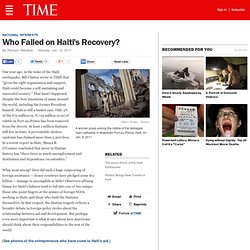
" That hasn't happened. Despite the best intentions of many around the world, including the former President himself, Haiti is still a basket case. Only 5% of the 675 million cu. ft. (19 million cu m) of rubble in Port-au-Prince has been removed from the streets. At least 1 million Haitians still live in tents. A preventable cholera epidemic has claimed more than 2,500 lives. What went wrong? How to Fix Haiti’s Fixers. In the outpouring of generosity since Haiti's earthquake last month, donors, investors, and charities have all made big moves to help.

Key countries pledged assistance at a January summit in Montreal. At the World Economic Forum in Davos, Switzerland, which fortuitously convened the private sector just a few weeks after the quake, there was also a new seriousness toward unlocking economic opportunities. Even individuals -- nearly half of U.S. households -- have donated to the Haitian relief and reconstruction effort in unprecedented amounts. The influx of money will provide immediate help for the profound suffering on the ground. But Haiti will need more than just relief: To transform this unfortunate and collapsed country, the whole system of aid needs a complete transformation, too.
Part of the problem is accountability, a serious issue in a country with such a weak central government and so many well-funded NGOs. Professional monitoring of NGO performance would be good for everyone. Lifestyles of the Affluent & Successful - Haiti. Haiti gains reputation as 'a republic of NGOs' The Nation: NGOs Have Failed Haiti. Hide captionPeople attend a prayer service near the Presidential Palace in Port-au-Prince in memory of those killed a year ago in the massive earthquake in Haiti.
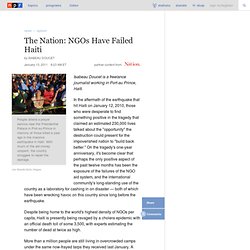
With much of the aid money unspent, the country struggles to repair the damage. Joe Raedle/Getty Images Isabeau Doucet is a freelance journalist working in Port-au Prince, Haiti. Sites/reliefweb.int/files/resources/E597D1071F4B3F52C1257714002D9D5E-Full_Report.pdf. OneYear Followup Report-Transparency of Relief Organizations Responding to 2010 Haiti Earthquake. Haiti Fail. Fred Sajous in Haiti questions the spending by NGO's there- American Red Cross. How Did the Red Cross Spend $106 Million Dollars in Haiti? 43% of Donor Pledges Disbursed, But Where? To Whom? The United Nations Office of the Special Envoy for Haiti (OSE) released updated figures on the status of donor countries’ aid pledges earlier this week.
The analysis reveals that just 43 percent of the $4.6 billion in pledges has been disbursed, up from 37.8 percent in June. This increase of $230 million is much larger than the observed increase in aid disbursement from March to June, when total disbursements increased by only $30 million. Also, an additional $475 million of aid money has been committed, meaning more money is now in the pipeline for Haiti. This increase is certainly a positive development, yet the overall levels of disbursement remain extremely low. The $4.6 billion in pledges was for the years 2010 and 2011, which means that donors have only a few months to fulfill their pledges. While $1.52 billion was disbursed in 2010, this year, less than 30 percent of that—$455 million—has been disbursed. Disbursed By Donor Doesn’t Mean Spent on the Ground Aid as Accompaniment. Don't forget Haiti, top U.N. aid official urges donors.
Haitian anger over cholera response. International Community Fails Haiti Yet Again – This Time With A Cholera Epidemic. Mark WeisbrotAl Jazeera English, September 8, 2011 See article on original website Mirebalais, Haiti — How is it that more than 6,200 people have died in Haiti from cholera in just the past 10 months, and yet resources to fight the disease were reduced earlier this year before the rainy season predictably led to an upsurge in infections and fatalities? And this is a country where international donors have pledged $5.6 billion since the January 2010 earthquake. The New York Times Editorial Board asked these questions on Tuesday. Just outside of Mirebalais, in the Central Plateau region, a Cholera Treatment Center is operated by Partners In Health, an NGO providing health care in Haiti for over 25 years. Under two big tents we see children in one and adults in the other, hooked up to intravenous fluid that is rehydrating their bodies.
But if the patient is treated in time, it is easily cured. Haiti didn’t have cholera either, for at least a century, until it was brought there by UN troops. Disaster Response, Self-Organization and Resilience: Shocking Insights from the Haiti Humanitarian Assistance Evaluation. Tulane University and the State University of Haiti just released a rather damming evaluation of the humanitarian response to the 2010 earthquake that struck Haiti on January 12th. The comprehensive assessment, which takes a participatory approach and applies a novel resilience framework, finds that despite several billion dollars in “aid”, humanitarian assistance did not make a detectable contribution to the resilience of the Haitian population and in some cases increased certain communities’ vulnerability and even caused harm.
Welcome to supply-side humanitarian assistance directed by external actors. “All we need is information. Why can’t we get information?” Sean Penn At Cannes: Haiti Was Abandoned By 'Whole F. Sean Penn has spent the last two years helping the relief effort in Haiti, and he's got little time for those who have long abandoned the country. "It's not only celebrities who went for a day," Penn said at the Cannes Film Festival on Friday when asked about the lack of support for the Haitian relief effort. "It's the whole f--king world. It's all of you. " Following the devastating earthquake that struck Haiti in January of 2010, Penn headed to the country and helped set up J/P Haitian Relief Organization, an aid group that rebuilt homes, schools and hospitals. For his efforts, Penn was awarded with the 2012 Peace Summit Award by the Nobel Peace Prize laureates, and also became an ambassador-at-large for the country.
"He was not a drive-by celebrity," former President Bill Clinton said recently. Echoed Maryse Kedar, the president of an education foundation who has worked with Penn, "I can tell you that Sean surprised a lot of people here. [via TheWrap] Loading Slideshow. Scientists Now Say U.N. Peacekeepers Likely Culprit In Cholera Outbreak That Killed Thousands. A panel of independent U.N. experts who investigated the source of a deadly cholera epidemic that killed thousands of Haitians has concluded that United Nations peacekeepers from Nepal "most likely" introduced the strain into the Haitian population. The panel's findings mark a dramatic retreat from their earlier, 2011 finding that found it impossible to assign responsibility for the strain's origins; the evidence was incomplete evidence, they said at the time, and too many things -- inadequate water, lousy sanitation -- contributed to the 2010 epidemic's spread.
Report from Haiti: Where’s the Money? Broken and collapsed buildings remain in every neighborhood. Report On Transparency of Relief Organizations Responding to the 2010 Haiti Earthquake. Kristiwooten: Wow. Fascinating stat: the... Msirismg: Donated money for Haiti ea... A Beer With Mark Snyder in Haiti. Failure in ‘The Republic of NGOs' Eric Klein is downing his first beer of the evening and smoking cigarettes as if the rapid injection of sugar and nicotine were all that stood between him and a torpor he's in no mood to embrace.
It's only 7 p.m., although that always feels like 10 p.m. in Haiti, and the effect of this quick consumption is all but intravenous in its effect. Klein talks quickly, angrily, his language sometimes ripening with words not generally considered polite, but scarcely out of place for an exhausted guy in khaki wearing a Red Sox cap with a Boston accent to match. He's dappled with pools of sweat after a day spent delivering water to the camps, ahead of another day ferrying food to orphanages in a hired tap-tap, one of the converted pickup trucks that normally serve as private buses. So, yes, Klein has appeared on Oprah. MINUSTAH and Cholera are twins. Anti-UN Protest in Port-au-Prince, Haiti. How the World Failed Haiti.